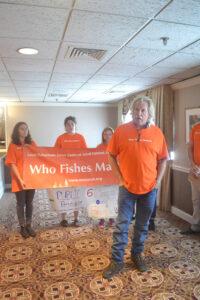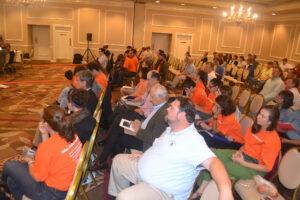Fishery Defenders Celebrate NOAA’s Charges Against “Codfather”
The National Oceanographic and Atmospheric Administration (NOAA) issued charges for Carlos Rafael, the notorious “Codfather.” Rafael faces fines nearing $1 million, a revocation of fishing and dealer permits, and a lifetime ban from all fisheries.
NOAA’s action on January 10 of this year follows Rafael’s arrest in February 2016 for charges including falsifying fishing quotas, bulk cash smuggling, and tax evasion. After Rafael pled guilty, Judge William Young of the U.S. District Court sentenced him to 46 months in prison and demanded fines and forfeitures totalling $2.5 million.
The Northwest Atlantic Marine Alliance (NAMA), a member-organization in the National Family Farm Coalition (NFFC, a Grassroots International partner), is celebrating this as a victory against industry consolidation and environmental abuse. But NAMA is also keeping up the pressure. Stopping more Codfathers requires deeper institutional change.
For thirty years, Rafael has used underhanded tactics to build an empire in the ocean waters of New England. He was sentenced to six months in prison for tax evasion in the 1980s. In 1994, he was indicted for price-fixing.
The February 2016 arrest stems from fraudulently mislabeling 800,000 pounds of fish and building an elaborate conspiracy to hide the money. He caught fish his permits didn’t allow and he called them something else. According to NAMA, Rafael’s actions threatened livelihoods of every fisherman of groundfish and scallops in New England.
“While New England groundfish is only a fraction of the overall domestic catch (less than 1%),” NAMA wrote in a victim impact statement, “the economic loss based upon Mr. Rafael’s actions ranges upwards into the hundreds of millions of dollars affecting thousands of jobs.”
As Judge Young told Rafael during his sentencing in September, “This was a corrupt course of action from start to finish… [It was] designed to benefit you. To line your pockets. That’s what it was and that’s why the court has sentenced as it has.”
But as NAMA has argued, Rafael’s crimes were aided by federal policies that have made the industry’s big fishes like the Codfather even bigger. With the New England Fishery Management Council’s (NEFMC) introduction of a Catch Share program in 2010, the Codfather empire grew at cancerous rates.

Catch Shares programs privatize public fisheries and ocean territory by creating a trading market over the “right” to catch a certain amount of fish in a particular area. Investors trading from an Arizona golf course can now own and rent out their shares to fishermen in Massachusetts.
In New England’s case, their fishery council set up shares in the lucrative groundfish market, which includes cod, haddock, pollock, flounder, and other North Atlantic staples. The policy drove more small-scale fishing vessels out of business while allowing Rafael to grow larger and larger.
In 2010, the first year of the program, 440 vessels were catching groundfish in New England waters. By 2013 roughly 120 boats, over a quarter of the groundfish vessels, had left the business.
Catch Shares were officially intended to limit the overfishing of certain fish, like haddock. Yet the groundfish population and the overall ecosystem have still suffered.
By having control over every aspect of the cultivation process, Rafael could mislabel the fish he caught as other species he had permits to fish. His fraud may have thrown off scientists’ estimates by millions of fish, and biologists have stated fish stocks have been well-below expectations.
Besides Rafael’s fraud, the Catch Share program as a whole shares the blame for overfishing too. According to the Gloucester Times, big boats “flaunt their scale and have their way” with the cod population in fishing areas like the Stellwagen Bank. These large boats can wait for the best days and chase down fish pulses, snatching up big chunks of the groundfish population in little time.
“There is no doubt in my mind and based on my experience that the lack of groundfish on Stellwagen Bank is a direct result of the Catch Share system now in place,” wrote Captain David Waltrip in a public comment submitted to the New England Fisheries Management Council in 2012.
Privatized Catch Shares and other market-based approaches are no alternative to the public stewardship and community-based care NAMA advocates. But the New England Catch Shares program is even worse than most. While the Alaskan Catch Shares program introduced in 1997 restricted vessels to fishing only 0.5-1% of the overall fish haul, New England allows an individual vessel 15.5% of the groundfish haul.

NAMA organized small-vessel fishermen and local communities to speakout at NEFMC meetings to reform the program. Dozens, nearly a 7-to-1 ratio, spoke in favor of an amendment to limit the haul quota and protect small fishermen. But the NEFMC ignored them. The NEFMC followed the wishes of big fishermen and aquabusiness. The Codfather himself had publicly committed to $10 million to fighting the haul limits.
Gloating about his power over the NEFMC, Rafael attacked small fishermen demanding stronger quotas at the council’s meetings: “The maggots screaming on the sidelines, they’re done. They can scream all they want. Nobody can save them.”
Since his conviction, NAMA has argued that Rafael’s fleet and permits should be redistributed to even out the playing field and bring back a balanced fishery fleet. If his fleet is merely sold off to the highest bidder, then a new Codfather can arise and easily take Rafael’s place.
So critical issues, both with the shell of Rafael’s empire and the Catch Shares program as a whole, remain. Still, NOAA’s action represents the largest revocation of fishing rights in U.S. history. It’s a step forward for defending our fisheries and the small-scale fishing captains that depend on them. If NAMA and others can keep up the pressure, the Codfather’s convictions can become a watershed moment to reopen a debate on sustainable community alternatives to Catch Shares.
Over a hundred years ago, American labor leader Eugene V. Debs remarked, “There is something wrong in this country; the judicial nets are so adjusted as to catch the minnows and let the whales slip through.”
The recent victories against the Codfather are stitches in the nets that can protect our fisheries and make sure whales like the Codfather face the justice they deserve.


